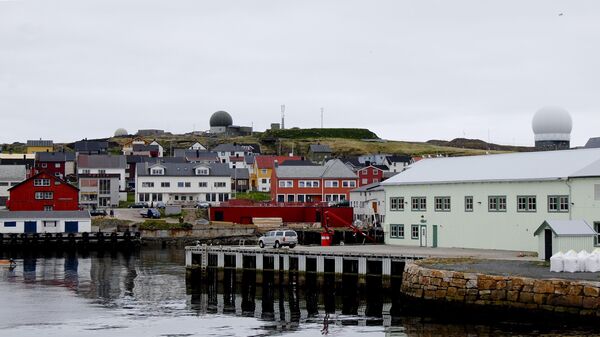While presenting Focus 2019, the Norwegian Intelligence Service's most recent analytical report on threats and security, its director Lieutenant General Morten Haga Lunde claimed that Russian Su-24s flying in an attack formation performed a mock strike on a Norwegian radar array about a year ago, turning away shortly before entering Norwegian airspace.
During his speech at Oslo's Military Society, Haga Lunde revealed a map of a wing of 11 Sukhoi-24 (NATO code name: Fencer) supersonic attack aircraft taking off from Monchegorsk air base on the Kola Peninsula and flying out over the Barents Sea before making a sharp turn and proceeding in an attack formation towards Vardø, Norway's most northeastern town and home to a powerful radar administered by the Norwegian Intelligence Service. The exercise allegedly happened on 14 February, 2018.
Morten Haga Lunde claimed that this scenario was very similar to what allegedly took place on 24 March 2017, but with more aircraft. At that time, Norway claimed nine Russian jets took part in the mock attack.
READ MORE: Norway Beefs Up Arctic Defences at Russia's Doorstep
Haga Lunde also claimed that Russia's rhetoric against Norway has become "sharper".
Kristian Åtland, an expert on Russian military activities in the Arctic with the Norwegian Defence Research Establishment (FFI), told the Barents Observer news outlet that the mock attack resembled a "deliberate and carefully planned Russian signalling operation".
Åtland suggested that this is Russia's way of conveying its displeasure with political or military developments in the country's northwest. He called the alleged mock attack "strategic communication by non-verbal means", which, he claimed, was aimed at influencing or intimidating Western political or military decision-makers. According to Åtland, the "emerging challenges" in the High North don't contribute to an atmosphere of trust and predictability at the regional level.
The Norwegian fishing village of Vardø has, due to its proximity to the Kola Peninsula, home to Russia's Northern Fleet, become the perfect location for radar surveillance. Since 1998, Vardø has housed a radar installation called Globus II, which is officially tasked with tracking space junk. However, its believed role in the US anti-missile system and capability of building a signature database of Russian missiles have made it a thorn in Norwegian-Russian relations. An updated and more powerful radar called Globus III has been under construction since 2017.
READ MORE: Too Big! Norwegian Locals Sulk Over False Info on New Top Secret US Radar
Earlier this week, the Norwegian Intelligence Service claimed in its annual report that Russia had blocked GPS signals in Norwegian border regions "in repeated incidents since 2017", adding that these incidents coincided with military drills in Norway, such as the Trident Juncture held in late October and early November 2018. These allegations, also voiced by Finland, were dismissed by Russian Foreign Minister Sergei Lavrov as "fantasy". Earlier, Russian presidential spokesman Dmitry Peskov noted an existing trend of accusing Russia of "various deadly sins".
So far, Moscow has yet to comment on the mock attack allegations.


